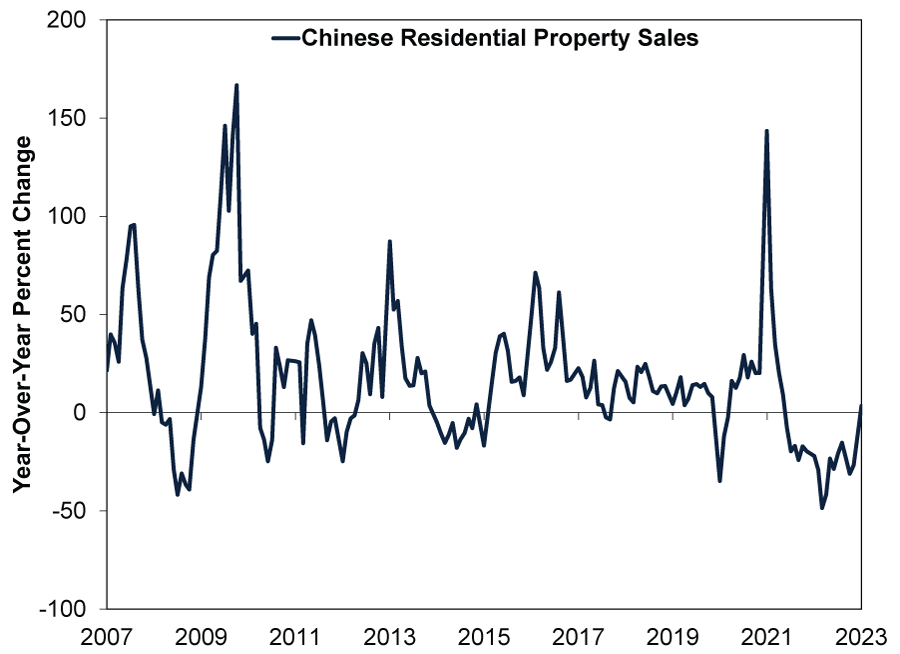Personal Wealth Management / Economics
Don’t Overlook Chinese Property Stabilisation
We think property market improvement in the world’s second-largest economy is underrated.
China’s property markets, long a weak spot, are beginning to stabilise, in our view. Against 2022’s real estate freefall and hard landing warnings amongst commentators we follow, we think Chinese housing’s improved prospects are another sign the world’s second-largest economy—and, therefore, global growth—is likely to fare better than widely anticipated.[i]
Chinese real estate activity cratered last year, after Chinese property developers’ longstanding debt woes came to a head starting in late 2021.[ii] Annual property sales measured in terms of floor area fell -24% in 2022.[iii] Property investment declined -10%, whilst construction starts dropped -39%.[iv] Many publications we read suggested the carnage was likely to continue in 2023, but the decline has slowed substantially, suggesting to us the worst may have passed.[v] In January-February, property investment’s contraction eased to -5.7% y/y, and new construction fell a milder -9.4%.[vi] (China combines the first two months’ data to reduce Lunar New Year holiday skew, as the holiday shifts between January and February.)
Meanwhile, January-February property sales by floor area slipped -3.6% y/y.[vii] As Exhibit 1 shows, though, January-February property sales in yuan rose 3.5% y/y, stabilising from a -48.6% decline last April. Now, that gain is off a low base, but we find that is how recoveries often start. And this is as average home prices rose in February for the second consecutive month (per a separate report, which doesn’t combine January and February data).[viii] After January’s 0.1% m/m gain, they accelerated to 0.3% in February.[ix] Price recovery is also broadening, with 55 of 70 cities appreciating last month versus 36 in January.[x]
Exhibit 1: Chinese Housing’s Boom, Bust and Nascent Recovery
Source: FactSet, as of 16/3/2023. China residential property sales in yuan, January-February 2007 – January-February 2023.
Many commentators we follow argued 2022’s real estate devastation would cause a full economic hard landing, and some still say that looms. We didn’t buy it, as our research shows most estimates tended to overrate housing’s impact. But China continued growing throughout 2022.[xi] Although growth was historically weak, we observed it was a slowdown, not the out-of-control crash those commentators warned would overwhelm authorities. Other parts of the economy filled the gap.[xii] Whilst residential construction slumped, infrastructure development and manufacturing took up the slack.[xiii] For example, except for one dip in April, industrial production grew year-over-year throughout 2022.[xiv]
Policymakers introduced measures to support property markets alongside easing COVID restrictions and loosening lending somewhat to the broader economy.[xv] Regulators relaxed rules like August 2020’s Three Red Lines, which was designed to shore up property developers’ balance sheets.[xvi] This allowed healthier ones to recapitalise, extend loans and raise funds to buy up units for rental conversion.[xvii] The state has also stepped in to assist homebuyers by helping make mortgages more affordable.[xviii] We can’t say China has definitively achieved a soft landing, but recent data hint at a nascent property recovery which, together with its latest purchasing managers’ indexes, suggests to us reality may be turning out better than anticipated.
Amidst the flurry of headlines we have read warning about global calamity lately, quiet improvement in issues that were raising alarm last year—like China’s property sector—is largely flying under the radar, in our view. Now, this is all backward-looking data, which we think forward-looking markets likely largely reflect already. As a general sign of sentiment, though, we see it as indicative of the persistent pessimism that our research finds births new bull markets. We don’t know if that is underway today or yet to come—there will never be an all-clear signal, and there are obviously other forces competing with this globally. But despite the din, good news going unnoticed is a great sign for attentive investors, in our view.
[i] Source: FactSet, as of 20/3/2023. Statement based on China’s gross domestic product (GDP, governments’ measure of countries’ economic output) relative to the rest of the world’s countries’, Q4 2022.
[ii] “China’s Property Sector Draws Closer to Exit From Protracted Slump,” Liangping Gao and Ryan Woo, Reuters, 15/3/2023. Accessed via MSN.
[iii] Ibid.
[iv] Ibid.
[v] Ibid.
[vi] Ibid.
[vii] Ibid.
[viii] “China New Home Prices Rise in February but Unsold Homes Cloud Outlook,” Liangping Gao and Ryan Woo, Reuters, 16/3/2023. Accessed via MSN.
[ix] Ibid.
[x] Ibid.
[xi] Source: FactSet, as of 20/3/2023. Statement based on China GDP, Q1 2022 – Q4 2022.
[xii] Ibid.
[xiii] Ibid.
[xiv] Source: FactSet, as of 20/3/2023. Statement based on China industrial production, January 2022 – December 2022.
[xv] “China’s Corporate Loan Growth Picks Up on Rising Property Aid,” Staff, Bloomberg, 10/1/2023. Accessed via MSN.
[xvi] “China May Ease ‘Three Red Lines’ Property Rules in Big Shift,” Staff, Bloomberg, 6/1/2023. Accessed via Yahoo!
[xvii] “In China’s Property Crisis, Global Asset Managers See Opportunity in Rental Housing,” Clare Jim, Reuters, 15/11/2022. Accessed via Yahoo!
[xviii] “China Establishes Mortgage Rate Adjustment Mechanism for Some Home Buyers,” Staff, Reuters, 5/1/2023. Accessed via Yahoo!
Get a weekly roundup of our market insights.
Sign up for our weekly e-mail newsletter.

See Our Investment Guides
The world of investing can seem like a giant maze. Fisher Investments UK has developed several informational and educational guides tackling a variety of investing topics.





